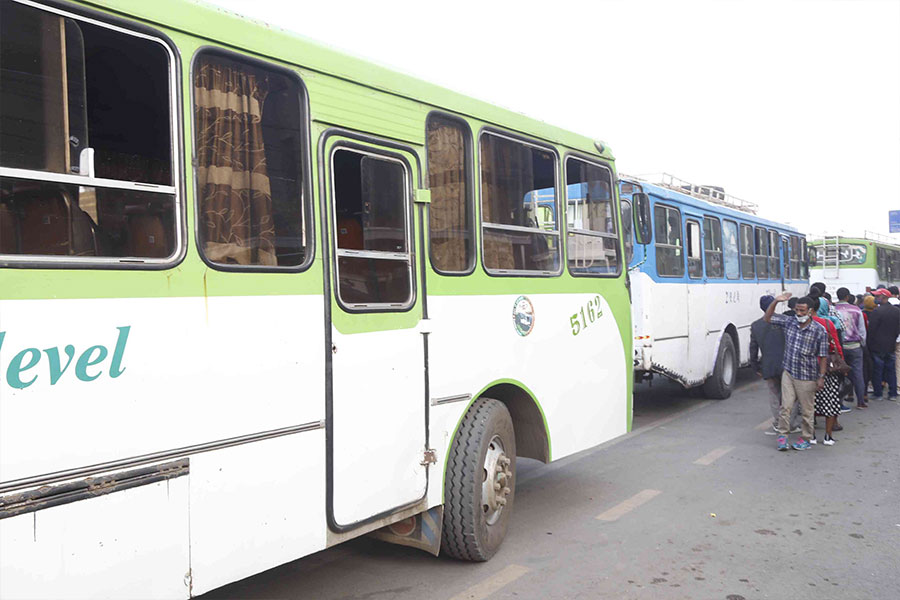
Commentaries | Mar 25,2023
At the heart of the city, the Zemen Gebeya New Year bazaar inside the Exhibition Hall behind Meskel Square was ready for the season. From the outside, strings of bright lights wrapped the venue, music spilt onto the street, and eager shoppers shuffled toward the gates, each paying a 200 Br entrance fee before stepping into the bustle within.
On first glance, the bazaar had all the trappings of a holiday fair. There were food stalls, colourful booths stacked with perfume, jewellery, electronics and clothes. Children tugged at their parents’ sleeves, stalls sizzled with the scent of roasted meat and coffee, and music echoed off the walls. But behind the decorated counters, the atmosphere was different from years past. For stallholders like Kokeb Seyoum, who was adjusting a stack of hoodies at her stall, the mood was sombre.
“You can definitely say there is no market this year,” she told Fortune.
Quietly forcing a smile, Kokeb arranged the neatly folded rows of children’s clothes, all tagged with the bold logo of "Mimi’s Fashion," the garment company she runs with her sister. This was her second year at the bazaar. Last year, she remembered, the crowds were relentless, and she and her staff had left each night exhausted but satisfied. This season, she was alone in her nine-square-metre booth, watching passersby linger without buying.
Bazaars are supposed to be the golden ticket for traders, the time of year when sales soar and profits can make up for slower months. Last week, they seemed like a gamble with the odds stacked against the vendors. For Kokeb, costs kept rising. The stall itself set her back 230,000 Br, up by a third from the previous season. Children’s clothes were priced between 600 Br and 1,000 Br, with adult wear going up to 2,000 Br. She needed hundreds of sales to break even. On top of that came the cost of transport, daily labour, and rising textile prices.
“We don’t normally sell directly," Kokeb told Fortune. "We supply shops around the country.”
She was determined to show up every holiday season. Not doing so, she feared, would mean fading from the minds of customers. For Kokeb, loyalty to the venue and the hope of building long-term customer relationships kept her returning to the bazaar. Away from the garment business, she and her sister also run "Mimi’s Addis," a restaurant in Bole. But the losses from the garment stall were harder to ignore.
“At this rate, the loss will definitely be more than the gains,” Kokeb admitted.
With the arrival of the New Year, the familiar rush of holiday shopping may have swept through Addis Abeba. However, for many vendors and families, this year’s excitement carried an uneasy undercurrent.
Another veteran vendor, Abeba Abate, stood with her two brothers at a familiar spot. They had attended the bazaar for more than 15 years and remembered seasons when the crowds were so thick there was barely room to stand.
“You wouldn’t even have time for this interview,” she joked, glancing down the nearly empty aisles.
This year, the siblings tried everything, offering “buy three, get one free” deals on items priced between 500 Br and 1,700 Br, but even that barely moved the stock. They, too, had spent 230,000 Br for their stall, but patience was running out.
“The promotion and marketing of the event were weak," Abeba complained. "The previous were better. This time feels like we were hustled.”
While vendors expressed their frustration, organisers for Zemen Gebeya painted a far rosier picture. Natnael Zerihun, chief operating officer of the project at Tamesol Multimedia, the event’s organiser, insisted the bazaar had exceeded expectations.
“We expected a smooth experience for buyers, vendors, and partners," he said. "It has gone even better than planned.”
The numbers appeared strong on paper. Of the 300 vendor slots available, 285 were sold, with the remaining slots free to charities and start-ups. Sponsors included Dashen Beer, BGI Ethiopia, and Zemen Gebeya itself. Stall fees ranged from 150,000 Br for nine square metres to 300,000 Br for a 36Sqm space. Tamesol had won the bid to organise the bazaar for 92 million Br, with revenue streams from ticket sales, vendor fees and sponsorships.
Natnael projected between 300,000 and 480,000 visitors over the bazaar’s 19-day run, with special incentives like discounted meals and a raffle to win an electric car. From his vantage point, the bazaar was lively, gainful and popular. On the ground, however, the story was different.
For Fetiya Nurjeba, a first-time vendor, disappointment came swiftly. She had visited the bazaar before as a shopper and recalled it being busier and more energetic. This time, her own booth barely drew a trickle of customers.
“It’s nothing like I expected," she told Fortune. "I get a better return at my shop in Merkato."
She even dropped her prices compared to her store, but the gamble failed.
Inside the Exhibition Centre, competition for shoppers’ attention was fierce. Perfume sellers sprayed the wrists of passersby. Mascots in oversized costumes chased children up and down the aisles. Spice traders offered fiery paste to be sampled on palms and injera, hoping to win over lovers of raw meat. Food and beverage brands handed out samples, transforming parts of the venue into a tasting fair. For families, at least, the bazaar remained a place of discovery and delight.
Meseret Amare, a mother of three, described her outing as exhausting but memorable. Her son was captivated by a toy truck demonstration, and after some hesitation, she paid 2,000 Br for it. Her daughters longed for shiny necklaces, but those would have to wait.
“I don’t even know how much I’ve spent,” Meseret said with a tired laugh. “And I don’t feel bad that I did.”
By day’s end, she had bought clothes for her children and husband, jewellery for herself, and splurged on a 900 Br pizza. The family left with smiles and a group photo outside the venue.
But while some shoppers found moments of joy, the struggles at the Exhibition Hall contrasted sharply with another event taking place across town.
At the Buy Ethiopian Trade Expo, organised by Jorka Events at the Quality Village compound near Megenagna, the atmosphere was buoyant. The government-backed expo, launched in partnership with the Ministry of Trade & Regional Integration (MoTRI), was deliberately designed to be affordable.
“We've calmed down prices,” said Mekonnen Mahidere, technical manager at Jorka Events. “One could say they’re almost free.”
The expo hosted 200 vendors representing every regional state and city administration, backed by more than 15 sponsors, including Ethio telecom, AMG Holdings, TAF, and Derba Cement. Entry was free, music pulsed through the venue, and crowds were animated.
Prices were much lower than elsewhere. A bottle of sunflower oil costs 1,300 Br compared to 1,700 to 1,800 Br in other shops. Sheep sold for 10,000 Br each, thousands less than at other markets. Clothing, food and household goods were similarly discounted. For many families, these savings were crucial.
Abraham Kinde, leaving with his two brothers and three bottles of cooking oil, grinned.
“We came here only for the oil,” he said.
Nearby, 38-year-old housewife Rediet Getaneh wrestled with a sheep, delighted to have bought it for 10,000 Br, far cheaper than the 17,000 Br she had seen elsewhere.
“We decided to buy only chicken this holiday,” she admitted, “but when I saw the price I couldn’t resist.”
Vendors at the expo found the subsidised model worked for them too. According to Getachew Tilahun, who owns Mati Garment in Adama, his five-day stall cost 75,000 Br, and business was brisk. His brand, Matif, markets itself on “quality with a national sense,” and this year, the formula worked.
“We're receiving great feedback,” he said, as products priced between 500 Br and 1,500 Br flew off his shelves.
At Megenagna Square, yet another alternative appeared, a modest street bazaar lined with cultural clothing and holiday essentials. Among the stalls was Kidusan Abraham, a seasoned seller with over a decade of experience. Her display of handcrafted traditional garments drew curious shoppers. Unlike the pricey expos, her spot came at no cost, unlike in the past, which billed her 10,000 Br for the space.
"This year it is free," Kidusan told Fortune. "I’m happy for that.”
Foot traffic was light early in the week, but she was hopeful business would pick up as the holiday approached. For vendors like her, small community bazaars remain a lifeline, offering affordable and local options.
According to Fisseha Tibebu, deputy head of the Addis Ababa City Trade Bureau, the Bureau’s efforts are to make fresh produce and local markets more accessible. He viewed cooperative markets as an example of affordability and community spirit.
“These markets aren’t only about affordability,” he said. “They’ve become places where people connect, shop and celebrate.”
The Bureau has established dozens of produce markets across the city, simplifying shopping and ensuring a stable supply. Vendors should display prices clearly, and there are regular inspections to ensure goods are sold as planned. Ahead of the holiday, 20 new markets opened under the Bureau's oversight, with vendors selling at regulated prices.
“Although we follow a free market system, we have to curb inflation and illicit trade,” Fisseha said.
However, the wider economic strains remain hard to ignore.
Economist Mekoya Kebede cautioned that the rising cost of living is steadily eroding public interest and purchasing power, especially for lower-income citizens. While government revenues may be growing, he argued, policy priorities often feel disconnected from market realities. He urged the government to focus less on headline financial targets and more on policies that directly support households.
“People are struggling to keep up,” Mekoya said.
Despite expanded access to goods, he observed a sharp decline in transactional activity, attributing it to a combination of diminished consumer confidence and affordability. He called on policymakers to refocus on wealth creation and household-level stability, rather than abstract growth targets.
PUBLISHED ON
Sep 07,2025 [ VOL
26 , NO
1323]

Commentaries | Mar 25,2023

Fortune News | May 23,2020

My Opinion | Jan 27,2024

Fortune News | Feb 11,2023

Radar | Jun 12,2023

Life Matters | Aug 20,2022

Fortune News | Jul 17,2022

Editorial | Feb 24,2024


Money Market Watch | Apr 13,2025

Dec 22 , 2024 . By TIZITA SHEWAFERAW
Charged with transforming colossal state-owned enterprises into modern and competitiv...

Aug 18 , 2024 . By AKSAH ITALO
Although predictable Yonas Zerihun's job in the ride-hailing service is not immune to...

Jul 28 , 2024 . By TIZITA SHEWAFERAW
Unhabitual, perhaps too many, Samuel Gebreyohannes, 38, used to occasionally enjoy a couple of beers at breakfast. However, he recently swit...

Jul 13 , 2024 . By AKSAH ITALO
Investors who rely on tractors, trucks, and field vehicles for commuting, transporting commodities, and f...

Oct 25 , 2025
The regulatory machinery is on overdrive. In only two years, no fewer than 35 new pro...

Oct 18 , 2025
The political establishment, notably the ruling party and its top brass, has become p...

Oct 11 , 2025
Ladislas Farago, a roving Associated Press (AP) correspondent, arrived in Ethiopia in...

Oct 4 , 2025
Eyob Tekalegn (PhD) had been in the Governor's chair for only weeks when, on Septembe...